
|
The New World (2005)
In writer/director Terrence Malick's visually-stunning
poetic historical epic and costume drama - his fourth feature film,
with a score enhanced by Mozart's concerto and a recurring prelude
from Wagner's Das Rheingold, and marked by the extensive use
of narrated internal monologues:
- the evocative opening sequence, beginning with a
narrated invocation by a female voice (presumably Pocahontas): "Come,
Spirit. Help us sing the story of our land. You are our mother,
we your field of corn. We rise from out of the soul of you" -
hands extended upward from an unidentified figure (shot from a
low-angle), who was also swimming underwater with two other nude
maidens; the narration continued: "Dear Mother. You fill the
land with your beauty. You reach to the end of the world. How shall
I seek you? Show me your face, you, the great river that never
runs dry"
- the arrival of three ships on the coast of the New
World in Virginia, in the year 1607 - with the natives on land astonished,
curious, and fearful of the foreign vessels; the expedition was led
by Captain Christopher Newport (Christopher Plummer) with a landing
party, with the objective of establishing a colony
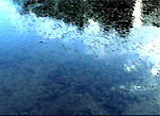
|

|
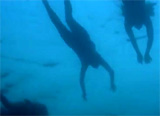
|
|
(Narration) "We rise from out of the soul
of you"
|
Unidentified Figure
|
Three Nude Maidens Swimming Underwater
|
- the introduction of idealistic and stubborn prisoner
Captain John Smith (Colin Farrell), who was removed from being
held under the deck, brought to shore, and was pardoned from being
hanged for mutiny, and admonished sternly by Captain Newport: "Now
remember, Smith, you come to these shores in chains. You’re
under a cloud, which will darken considerably if I hear any more
of your mutinous remarks. Is that understood?"
- the dialogue-free sequence of the first encounter
between the Europeans and the so-called "naturals"
- who timidly visited and approached the strange visitors "like
a herd of curious deer"
- the scene in which Captain Smith was chosen by Captain
Newport ("You have an opportunity to repair your reputation")
to lead an envoy inland; when the group became lost, it was confronted
and attacked, and Smith was captured by the natives; as the legend
told, he was brought before local Chief Powhatan (August Schellenberg),
when the lovely and graceful "princess" Pocahontas (Q'orianka
Kilcher), the favored daughter of Powhatan, saved him from death
out of curiosity and empathy ("At the moment I was to die, she
threw herself upon me"); she spoke to her father: "Spare
his life"; Powhatan responded: "He can teach her about
his land across the waves"
- the sublime, idyllic sequences of them falling deeply
in love - as he taught her English words for various objects: ("Sky," "Sun," "Water," "Wind," "Eyes,"
"Lips," "Moon,"
"Smoke," "Fire," "Heat" .); in narration
(off-screen), Smith described her: "Her father had a dozen wives,
but she was his favorite. She exceeded the rest not only in feature
and proportion, but in wit and spirit too. All loved her"; he
also described the native people: "They are gentle, loving, faithful,
lacking in all guile and trickery. The words denoting lying, deceit,
greed, envy, slander and forgiveness have never been heard. They have
no jealousy, no sense of possession. Real, what I thought a dream"
- with the love of Pocahontas, Captain Smith realized
his life's transformation: "I was a dead man, now I live...There
is only this. All else is unreal"; as they made love, Pocahontas
spoke (in voice-over): "Oh, to be given to you, you to me.
I will be faithful to you. True. Two no more. One. One. I am. I
am"
- eventually forced to leave the tribal group, Capt.
Smith was returned to the English settlement, where he was confronted
by lack of leadership, in-fighting, starvation, crime, disease and
other evils (cannibalism) in contrast to the natives; Smith felt
like he had been awakened from his "dream"; during the
winter, the "Princess" brought a rescue party with food,
clothing, and supplies to the beleaguered and starving Jamestown
fort inhabitants - where Smith had been appointed governor; they
were briefly reacquainted, but Smith feared if they showed too much
recognition, her life was in danger; she asked: "Why have you
not come to me?...Who are you whom I love?"; although there
was a time of falling back in love, the two realized the difficulties
inherent in their relationship (Smith: "Where would we live?
In the woods? On a treetop? A hole in the ground?")
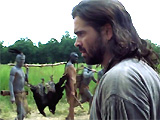
|
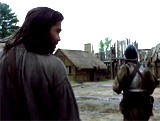
|
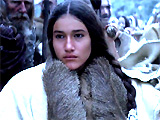
|
|
Smith Returned to Jamestown
|
The Drab Rundown Settlement
|
Pocahontas Saving the Jamestown Settlement
|
- the scene of Pocahontas' despair and mourning for
the death of Captain Smith when he abandoned her to search for
the Northwest Passage, and she was told that he had died during
his ambitious journeys (a false claim)
- Pocahontas, now married to loyal farmer-husband
John Rolfe (Christian Bale), was summoned to England to meet King
James (Jonathan Pryce); she experienced an uncomfortable reunion
scene in the garden of a country estate with her first love: regretful
Jamestown explorer Captain John Smith, as they remembered their past
together, and
he admitted that he had made a mistake in leaving her: Smith: "Did
I make a mistake in coming here?...Perhaps I'm out of order speaking
with you this way, but I've thought of you often....You knew I
had promise, didn't you?" Pocahontas answered: "Yes.
Did you find your Indies, John? (pause) You shall" - he replied:
"I may have sailed past them" - Smith responded that what
they had in Virginia (the New World) in their past was not a dream
but the real 'truth': "I thought it was a dream - what we knew
in the forest. It's the only truth. It seems as if I was speaking to
you for the first time"; she slightly bowed to him, turned, and
sadly walked away
- their reunion was followed by her expression of fully
devoted love (and kiss) to her husband John Rolfe at the estate;
she walked up to him and gave him an arm embrace; and then she asked: "Could
we not go home?" and he responded: "As soon as possible";
she devotedly called him: "My husband" as she gave him
a kiss
Reunion of Captain John Smith with Pocahontas
in England
and Love For Husband John Rolfe
|

|
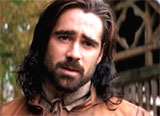
|

|
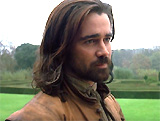
|

|

|
- in the film's conclusion, she was running and playing
hide-and-seek with her only child Thomas (Jonathan Gonitel) in
a manicured English garden of the estate; but before returning
to the New World with Rolfe, Pocahontas acquired pneumonia and
died in bed (with her weeping husband next to her), on the 13th
of April, 1616; in voice-over, and in death, Pocahontas closed
her eyes and spoke to her mother: "Mother,
now I know where you live"
- Rolfe's words (in voice-over) described her death,
as he read his letter addressed to their son Thomas about his deceased
Native-American mother (aka Rebecca):
"Dear Son, I write this so that someday in the future you might
understand a circumstance which shall be but a far memory to you. Your
dear mother, Rebecca, fell ill in our outward passage at Gravesend.
She gently reminded me that all must die. 'Tis enough,' she said, that
you, our child, should live"
- in the last sequence, Rolfe and the boy set sail
for America, and the film closed with shots of the clear streams
and towering forests of the New World
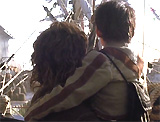
|
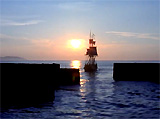
|
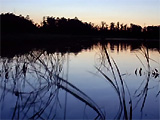
|
|
Rolfe and Son Thomas Onboard
|
Sailing for America
|
The New World
|
|

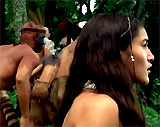
The Landing Witnessed by Natives
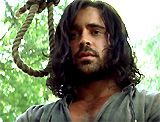
Captain John Smith
(Colin Farrell) Pardoned from Hanging

Initial Contact Between 'Naturals' and British Expedition
in New World
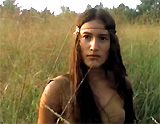
Captain Smith's First Sighting of Pocahontas
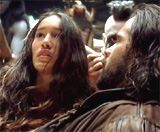
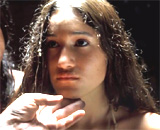
Pocahontas Pleading for Captain Smith's Life
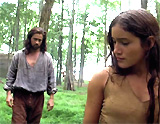
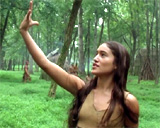
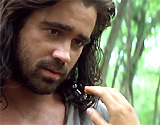
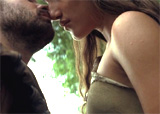
Falling in Love - Teaching Pocahontas English Words
for Objects
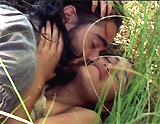
Making Love
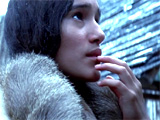
Winter Scene: Smith's Brief Reacquaintance with
Pocahontas
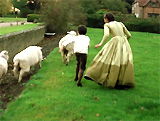
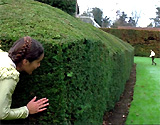
Running and Playing in English Gardens with Son
Thomas
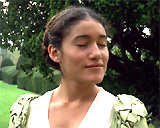
(voice-over) "Mother, now I know where you
live"
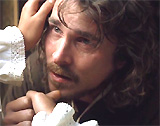
Rolfe Grieving at Pocahontas' (Rebecca's) Deathbed
|


















